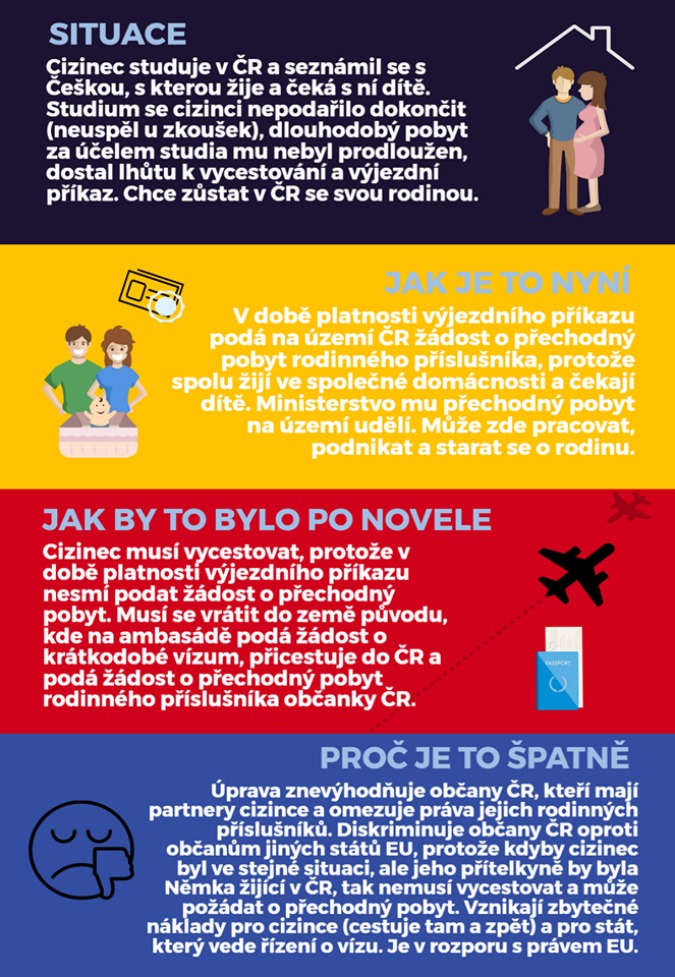Earlier this month, President Zeman signed into law an amendment introducing tighter rules for foreigners in the Czech Republic. We spoke with Tomáš Jungwirth, Policy Officer at the Consortium of Migrants Assisting Organizations in the Czech Republic to find out just how big of an impact the amendment could have on foreigners residing in the Czech Republic:
How is this legislation a reaction to the current migrant controversy?
It reflects a political backlash against non-EU migrants living in the country, not just asylum seekers, and in many ways reflects a more restrictive migration policy. Despite attempts by large employers, chambers of commerce, and NGOs, this legislation passed. The most controversial part was rejected (taking out the judicial review) but all of the other parts passed. It goes into effect in August.
Interior Minister Chovanec has said the changes provide security.
If you go into the specific permissions of the act, there is no mention of state security in the reasoning of the amendment, neither of the provisions has anything to do with safety. This is a smoke screen aimed at creating administrative barriers.
What message is being sent here and who is it aimed at?
Labor migrants who are on one hand in high demand on the Czech job market but at the same time ostracized and denounced as criminals. This amendment also targets legally residing students and the families of those workers. There are unnecessary costs for foreigners (travel back and forth), and for the state conducting the visa procedure. It is contrary to EU law.

What about Czech citizens who have foreign partners?
It discriminates against citizens of the Czech Republic compared to citizens of other EU states as it restricts the rights of their family members, because if the alien was in the same situation, but his girlfriend would be a German living in the Czech Republic, he does not have to travel and can apply for a temporary stay.
How exactly will it be more difficult for foreigners to reside here?
People who have been living in the country for a long time but want to change jobs or those who want to change the purpose of their stay to business will find it more difficult: changing from employee status to freelancer used to be possible after two years, now it will require five years. And then there is the issue of family members. Changing a status to a family member might mean, under the new law, that a foreigner must travel to his country of origins to apply and come back.
Give us a particular scenario where the new policies might affect our readership.
A student or foreign worker has fallen in love with a Czech; she is pregnant, he hasn’t yet finished his studies and now he applies for a family status be is told that he can’t do it at this point and must leave the country. These are the kinds of complications without reason that foreigners are going to experience as in this case, the foreigner should eventually be able to stay. Essentially this is costly and time-wasting administrative bullying.
Will it be more difficult for non-EU citizens to relocate to the Czech Republic?
No. There is no change for the sake of relocation. If a person comes on a tourist visa and asks for a work permit or work visa generally there shouldn’t be a change, it is when a person loses their job or plans to change the employer that it becomes restrictive. Unfortunately, to change a job requires confirmation that the given person is actually going to their present employer; saying you intend to leave and asking for confirmation of employment can obviously be problematic.
What does the legislation mean for EU citizens?
The act significantly broadens the reasons for which an EU citizen can be denied residence in the country. While in the past, it had to be assessed whether the given individual presented a threat to the public order, under the new legislation, the residence permit shall be automatically denied or withdrawn to EU citizens who had been convicted of crimes of a certain gravity. In my opinion, this is in clear violation of EU law.
What is your advice to those reading who may have concerns about their status?
Do not over react. The changes are not going to affect every single foreign citizen. This amendment isn’t even likely to affect the majority of people residing here. Specifically, those transferring employment, their family members, and people who intend to start a business will be the most affected.
The Consortium of Migrants Assisting Organizations in the Czech Republic has prepared a useful document with more information, in English, here.












 Reading time: 3 minutes
Reading time: 3 minutes 



























